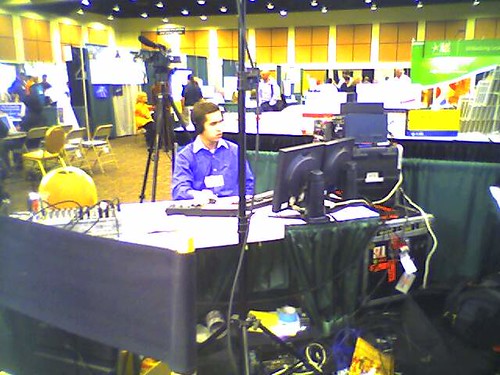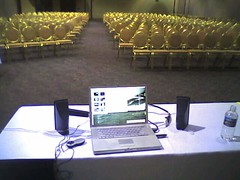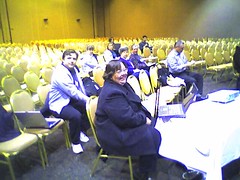I had a singular experience at CUE (CUE2006) this weekend, that those of you who have seen my Literacy & Learning (Redefining Literacy for the 21st Century) keynote will identify with. It was shortly after 9:00 AM. I had just finished my spotlight address and was gathering my computer and stuff for my next appointment. A few people had come up with questions and to share what they were doing, and a young woman was hovering at the edge, with a notepad. After a moment, she walked up, and said that she was doing short interviews for the conference, and would I mind answering some questions.
I said that I needed to get my equipment out of the way so that the next presenter could set up, and “…what are your questions?”
She replied, “What was the main point of your presentation? and What do you think is the best thing that people, who are attending CUE, should walk away with?”
I started answering the first question, but she interrupted me pointing back to the back of the room, “We would like to video your answers!”
I looked back — at a young man with a hulking video camera resting on his shoulder, and that customary tremor of terror ricocheted through my body. I don’t like cameras.
I went back with them, and started answering the questions, with my computer bag on my shoulder, and my good friend, Sara Armstrong, ready to walk with me to the exhibitor’s area where we could talk and catch up. I answered the first question by briefly describing how content is changing, as a result of Web 2.0 applications, and that our notions of literacy must also change. Then I started answering the second question, that I’d like for participants to leave not only with new ideas about using modern technologies, but also, and perhaps even more importantly, that they leave with new stories, to take back to their schools and their communities and tell, inspiring people to think differently about teaching and learning.
It was then that she asked if I knew Marco Torres, and I said yes, and then it hit me. I looked down at her name tag, back up at her face, down at her name tag again, and blurted out, “Your Consuelo Molina!” “You made the Sweatshops video!”
She blushed and said, “Yes!”
“You’re Consuelo Molina!” I looked around at the people who had gathered, and said, “This is Consuelo Molina! I’ve met Consuelo Molina!” “I don’t believe it!” I couldn’t contain myself.
“Yes!” She said, obviously becoming embarrassed.
“This is what I’m talking about. It’s a story — a compelling story. I show your video to illustrate to educators how students can now learn, process, and then take what they learn, and turn it into a compelling story. It’s what we need to retool education. ..a compelling new story.”
Unfortunately, I didn’t have the wits about me to suggest that someone take a picture of me with Ms Molina, so I do not have the proof. But it just goes to show how a simple classroom assignment can affect people around the world and how just looking down at a name tag, can put you in the presence of a very important person.
I’ll not forget that meeting, even if I can’t prove it.
Way more than 2¢ Worth.

 Chris Walsh’s CUE webcasts are up — and I didn’t do so bad with the accountability question. You can view my interview at:
Chris Walsh’s CUE webcasts are up — and I didn’t do so bad with the accountability question. You can view my interview at:


 It’s going to be one of those days when I truly begin to wonder why I’m doing this. It starts at 3:40 AM EST. I’m up blogging, because I woke up thinking about stuff. After that, I will finish my online handouts for today’s presentations and go over (and probably rearrange) today’s slides.
It’s going to be one of those days when I truly begin to wonder why I’m doing this. It starts at 3:40 AM EST. I’m up blogging, because I woke up thinking about stuff. After that, I will finish my online handouts for today’s presentations and go over (and probably rearrange) today’s slides.  I love educational technology conferences. What’s left in education that truly fills me with optimism and excitement for the profession and our endeavors is going on at ed tech conferences. Admittedly, mine is a narrow perspective, but this is where you see all of the possibilities.
I love educational technology conferences. What’s left in education that truly fills me with optimism and excitement for the profession and our endeavors is going on at ed tech conferences. Admittedly, mine is a narrow perspective, but this is where you see all of the possibilities.  I will be flying up to Syracuse tomorrow to speak at a BOCES conference on Friday, and I am looking forward to that event. It will take place in a very old Inn in Whitesboro, NY. I suspect that the nearly 300 attendees who have registered are going to be tight. Just the same, we’ll get to know each other that much better. I’m sure that they will also know how to properly pronounce the word, “grits” when I leave 😉
I will be flying up to Syracuse tomorrow to speak at a BOCES conference on Friday, and I am looking forward to that event. It will take place in a very old Inn in Whitesboro, NY. I suspect that the nearly 300 attendees who have registered are going to be tight. Just the same, we’ll get to know each other that much better. I’m sure that they will also know how to properly pronounce the word, “grits” when I leave 😉